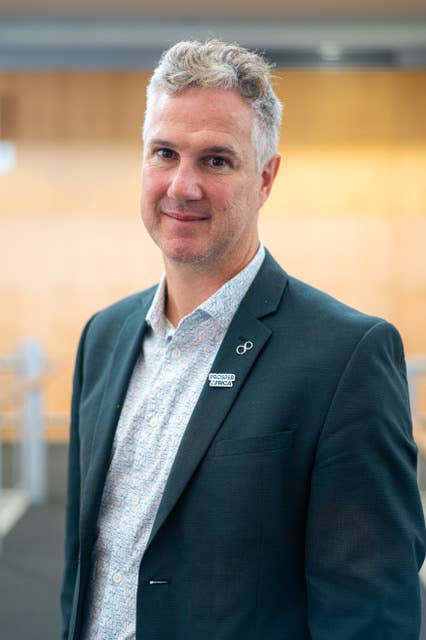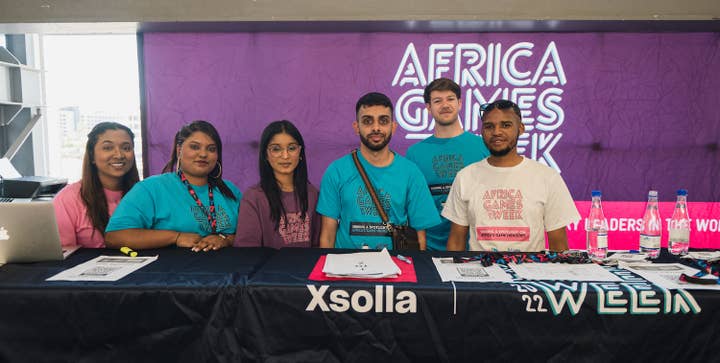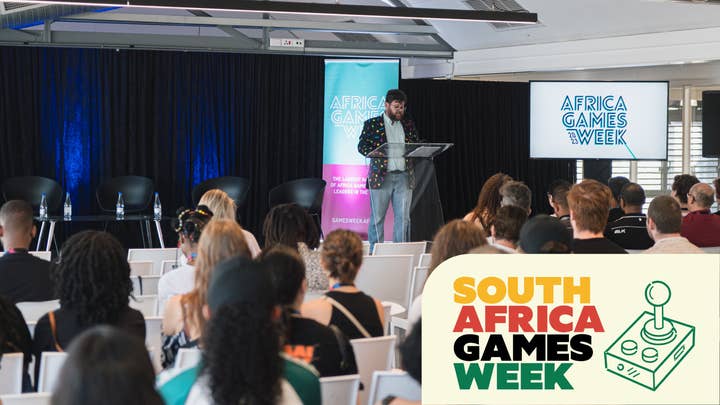Bringing the global games industry to Africa's unexplored markets
Africa Games Week co-founders Nick Hall and Rex Bowden on the future of the event and scaling the South African games industry
You can read all our South Africa Games Week articles on this page.
Africa Games Week held its sixth edition last December, welcoming over 1,980 attendees to Cape Town.
Over 360 companies were represented, and 93 speakers contributed to the conference track. Over on the showfloor, more than 250 African games were showcased, the organisers said.
While the story of Africa Games Week is intrinsically linked to the South African games industry, it does aspire to represent and celebrate games professionals across the entire continent.
"Conceptually, we've always had this idea that we're building a platform for African game developers to get access to the international market," says AGW co-founder Nick Hall, also CEO of interactive software dev RenderHeads South Africa and CEO of games trade body Interactive Entertainment South Africa.
"The fundamental problem that we're trying to solve is that the global games ecosystem mostly ignores Africa, both as a market and a development community. We're very isolated. We don't have easy access to things like GDC, Gamescom, or the Tokyo Game Show. Some of it is geographical, because South Africa is just far from everywhere. We can't quickly pop over to Gamescom. It's a 14-hour flight minimum, and that makes it expensive.
"But then also there are logistical things, like visas are always an issue. And there's this global distrust of Africans. There's an assumption we're going to come in and steal your jobs. So, it is difficult for African developers to get access to that international market."
Before Africa Games Week became a thing, Hall and co-founder and director Rex Bowden (also managing director of Catalyze, a business agency focused on championing South African firms) used to run trade missions for around 20 South African studios to go to GDC and Gamescom.
"The fundamental problem we're trying to solve is that the global games ecosystem mostly ignores Africa, both as a market and a development community" Nick Hall
"We did it a couple of times," Hall continues. "And it was good, but there were two main restrictions on it: we could only take South African studios – because the South African government was backing it – and there were also restrictions on who we could take. So, it wasn't ideal, but it did the job.
"When that funding programme got cancelled, we were like, 'Okay, well, we've seen the positive effect. Let's expand the scope. Let's make this for Africa. And if we can't get our developers to the world, let's bring the world to us'."
The duo settled on December for Africa Games Week so it wouldn't clash with any other major games events and to take advantage of the summer weather.
"It's [not] a very hard sell to get developers from snowier regions [where] it's winter, and it's dark," Hall says. "It's like, 'Well, you get to come to Cape Town for a bit'! It motivates people to get on that 14-hour flight. And I think we're coming more and more to that vision."
During the peak of the COVID-19 pandemic, the organisers ran the event online, to mixed results.
"It was an interesting opportunity for us to try out a theory, which was access – we still do actually have an access problem," Hall says. "We are far away from everywhere, even for our African cohort. So, the theory was, if we went completely online, would we get more people from more places? And we did. But it wasn't the same, and I think a big part of it is because the value proposition is those meaningful connections that you can build over time."
After COVID, Africa Games Week trialled a hybrid model, both in person and online. Hall says it "helped a bit" but "wasn't meaningful," adding that he felt that the people attending online were not getting the true value of the event.
Bowden continues: "It's too easy to log off… You watch something for a while, and then you're like, 'I'm going to do something,' and then an email comes in, and then before you know it, it's running in the background, and you've forgotten [about it]. And I've seen that across all industries. It's very difficult. B2B meeting programmes are also very hard to run."
The event still streams its talks, but the duo says they're keen to build upon the foundations of the successful physical event.
"I think the major evolution is we've built an amazing platform," Hall says. "We really have become the destination event. But it's figuring out how we maximise that value. And it has to fill very different propositions for our African developers and for our international developers. There was a bit of misalignment there. What we've been doing over the past three years is thinking about how we mesh those together."

Looking at the attendees' breakdown for the 2023 edition, 54% of AGW's attendees were from South Africa, 14% from Europe, 13% from East African, 7% from West Africa, 6% from North America, and 3% from North Africa.
"African developers generally want to come to Africa Games Week first and foremost so that they can meet other African developers," Hall says. "It's a huge networking opportunity. Something that we're very particular about [is] our talks. Anybody can go to GDC and hear a talk about games. [But] there are so many assumptions that go into those talks. It's assumed that you're going to have access to this tax credit [or prototyping grant] which is available. That's not true in any African state, and so the advice that they're giving doesn't hold true here. And it really dilutes the value of that talk.
"One of the requirements that we have when we bring speakers is they have to speak to the African reality. And [that's] also why we bring Africans who have gone through this process to share their experience. It's a very important platform for dialogue and knowledge-sharing… The other thing is obviously they get access to people like Microsoft [and so on]."
For international guests, there is often a commercial incentive to attend Africa Games Week, Hall continues.
"They need new interesting content, and Africa is an unexplored market," he says. "That's good, and we can provide that. The problem – and this is where the misalignment is – is that generally a lot of our studios aren't quite on the level where they can meet the expectations of what the publishers and investors need."
Bowden highlights the value of running a smaller event, making it easier to create multiple points of contact so attendees are able to build meaningful connections and have genuine conversations over the week, rather than short meetings. That aspect satisfies both African devs and international visitors.
"We're always trying to find more of that," he says. "[In 2022], there were 20 of us sitting at a secret bar that we had found around the corner, and there were full discussions between international investors and publishers as well as African studios, just finding a solution to how we can help open up opportunities with the governments in Africa. And that's something we've seen come through massively.
"We were the only ones getting funding in South Africa. In the last five years, we've seen it open up in various other African countries, it's really nice. So, that for me is super exciting."

South Africa very much appears as the poster child for the games industry across the continent, with a varied ecosystem that is going from strength to strength as we highlighted in our South Africa games industry in numbers article, and will continue to highlight throughout the week with interviews with Free Lives, 24 Bit Games, Nyamakop, and much more.
"I think South Africa's probably the most mature games development ecosystem on the continent," Hall says. "The Egyptians and Moroccans are maybe on par with us. We have more viable commercial entities here than anywhere else on the continent. People actually making games, and primarily making their income from games, either because they're servicing it or because they're making their own IP, is a success there.
"We have some big hits that have come out of South Africa. We make interesting, quality products, and games that can compete on an international level. I think we've carved out a bit of a niche for ourselves in terms of the type of games that we make. I don't know if it's just the reality of living in South Africa and having to deal with load shedding and everything else, but we're very snarky in our games. We like to make fun of other people and sell them that. [Free Lives'] Broforce is a good example of that, or Genital Jousting. QCF Design's Desktop Dungeons. All of our games tend to have this little bit of satire and parody, and that's become our shtick."

The South African games industry has a lot of momentum going in the services space as well, which Hall attributes to the fact the country is in the right time zone for Europe and has cheaper labour than European countries.
"We're not the cheapest, and we don't want to compete on price. But if you want quality at a good price, come to South Africa.A lot of our services companies have built very successful businesses on that basis and it's given us access to work on some amazing games because of it. That's then in turn led to more people thinking, 'Well, these guys worked on it and they were South Africans. What's going on down there? Can we find a nice South African team to come and help us do these things?' So, ultimately, in the last decade, we've seen a rapid growth in South Africa."
Hall says he's worried about "a bit of stagnation in the industry" though, as established South African games businesses are growing, but there are few new entrants.
"Part of it is because we don't have easy options for access to funding. From a market perspective, it's becoming tough, and so people are having to make hard decisions around, 'Can I follow my passion and my dream of building games?' But [they] still need to put food on the table. And we don't have any access to soft funding to litigate that. The other thing is we're seeing increasing pressure from other industries looking to take our talent."
Bowden notes that South Africa has the "largest gambling software development in the world" meaning it regularly poaches talent from the games industry.
Hall tells us that a junior at his company was approached for a position in a gambling firm that offered him five times his salary, plus school fees covered for his kids, and medical benefits. He says you simply can't compete with that in games.
"Amazon is also moving in now," he adds. "Amazon loves taking our engineers. And again, similar thing, they've got [these] amazing packages. So, that's a strain. People who stay in the space ultimately are passionate about games, that's the thing they want to do, and so they're prepared to make those sacrifices.
"We're also getting a brain drain. I've seen it with my own engineers, there's only so far they can go [in the games industry], but they've got world-quality talent and they know they've got world-quality talent. They're like, 'Well, I can just move to the UK, or I can go to Sweden and work for King'. So still stay in games, and there is a bigger career path."
"We would like to see more people use that week to have their own events, and use the platform that we've built to run their own events"Rex Bowden
To solve this issue, Hall says the South African games industry needs more people opening up businesses as entrepreneurs, and once these businesses exist, they need to be able to scale, which is a big priority.
Africa Games Week certainly already is a place for South African businesses to discuss and plan the next step in their journey. And for the co-founders, the goal is to be able to be that springboard for more African nations, too.
"We've got 25 of the 54 nations represented," Hall says. "How do we get all 54? That would be great. One of the other things is that Africa Games Week is kind of this umbrella [term] and then one of the events is Make Games Africa, which is the conference and the VIP day. But we would like to see more people use that week to have their own events, and use the platform that we've built to run their own events. We've seen that with Games For Change, for example [which hosted Games for Change Africa as part of AGW]. They've brought themselves on board. How can we grow that out? I'd love to see a consumer show form part of this eventually."
He notes that while there's Playtopia in Cape Town (more on that at the end of the week with our interview with Free Lives), the city doesn't really have a large consumer games show. He describes it as a "missing piece" that they wouldn't necessarily have to run themselves but could be tacked onto Africa Games Week.
This is exactly how Melbourne International Games Week became a major event in Australia, as Fran Kerlin told us last year: various events were "bolted on" until it grew to become this unmissable moment, combining B2B and consumer events.
"That'd be another way of getting more and more African and international delegates to come out, because you've got multiple things happening at the week," Bowden says. "We would really love to work with people and say, 'Okay, we'll take these two days, but you take the next. And if you want the weekend, take the weekend. We'd love you to do that, we'd love to get our weekend back," he laughs.
"And it is also a special purpose vehicle to access more funding. Everyone sees Africa Games Week, and we can get funding from certain governments and partners around the world, which [in turn] brings people in. So, we've got the French and the Swiss [governments] that have donated this year, and we want to get the UK government to start doing that kind of stuff as well. We've had the Canadians in the past, and so on. And they bring their delegations. We want to work in that manner. That was always the vision. Come do your event under our Africa Games Week brand. Let us utilise it."
Sign up for the GI Daily here to get the biggest news straight to your inbox
Africa Games Week provided GamesIndustry.biz with travel and accommodation for the December 2023 event.

